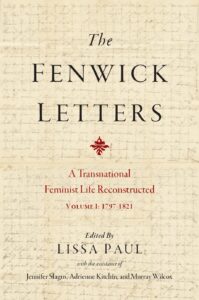
Lissa Paul
Editor(s)
Jennifer Slagus
Editor(s)
Adrienne Kitchin
Editor(s)
Murray Wilcox
Hardback
February 2026 • ISBN 978-1-64453-408-3 • $150.00
Paperback
February 2026 • ISBN 978-1-64453-407-6 • $72.95
* E-Book Available
Order Online
Series
Early Modern Feminisms
The Fenwick Letters: Reconstructing a Transnational, Social, Cultural and Political Life serves as a companion volume to Eliza Fenwick: Early Modern Feminist (2019). The first of this two-volume edition covers the initial phase—1797-1821—of Eliza Fenwick’s transformative, transnational odyssey as she moved from promising radical author (supporting emerging democratic, liberatory philosophies) to conservative schoolmistress and businesswoman; from the urban center of London to colonial slave-dependent Bridgetown, Barbados; from her status as wife of radical journalist and author John Fenwick (1757-1823) to her status as a single-working mother, trying to establish an independent life for herself and her children, Eliza Ann (born 1789) and Orlando (born 1798).
About the Editors
Lissa Paul is a Professor of English Language and Literature at Brock University, specializing in literacy and diversity. She is the author of Eliza Fenwick: Early Modern Feminist (2019) and The Children’s Book Business: Lessons from the Long Eigthteenth Century (2011). Her edited collections include Children’s Literature and Culture of the First World War (2016), eds. Lissa Paul, Rosemary Ross Johnston, and Emma Short; Keywords for Children’s Literature (2011), eds. Philip Nel and Lissa Paul; and The Norton Anthology of Children’s Literature (2005), eds. Jack Zipes, Lissa Paul and Lynne Vallone.
Adrienne Kitchin is a writer and educator focusing on women’s health and education. She is a PhD candidate in Social, Cultural, and Political contexts of Education at Brock University. Adrienne combines her background in medical anthropology and her doctoral research in educational studies to locate—and to produce—counternarratives to long existing tropes regarding how women’s pain is perceived in medical contexts. She uses new materialisms and counterhumanist anticolonialisms in her quest to close the gap in health disparities for women in their diverse intersectionality. Adrienne’s research is dedicated to all those who have fallen through the cracks.
Murray Wilcox is an independent scholar, though he is affiliated with Brock University. He is a collaborator with Dr. Lissa Paul in her SSHRC-funded research project on Eliza Fenwick. His research interests are eighteenth-century print culture and Romantic-period female authors. In his recent research on Eliza Fenwick’s life in Upper Canada, Murray has been able to trace Eliza’s social interactions with notable figures living there in the 1830s, including politicians, members of the British military and prominent local businessmen. As an archivist with the Addison Library at St Mark’s Anglican Church in Niagara-on-the-Lake, Murray has worked on the transcription and publication of two MSS found within the collection. Over the last few years, Murray has given talks at ASECS, CSECS, NESECS, and BSECS.
